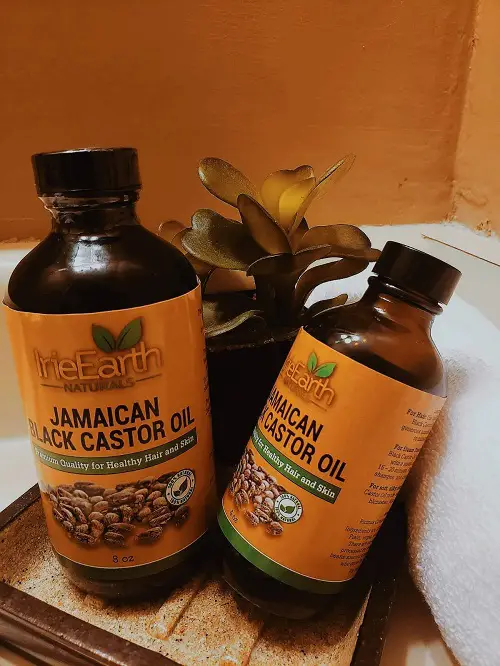Do you know what’s the Difference Between Castor Oil and Black Castor Oil? Read on to find out what makes each one unique!

Often touted as the solution to all things and hair, the widely used castor oil has two variants. Namely, yellow castor oil or just castor oil and black castor oil. But do you know why they’re named so? And do they have any differences in uses? Of course, they do! Keep reading to find out!
Difference Between Castor Oil and Black Castor Oil
1. Oil Extraction Methods
Regular castor oil is extracted from castor oil through the standard or regular cold-press methods. In this method, the beans are not roasted, thus conserving the oil’s natural yellow color.
On the other hand, castor beans are roasted before the extraction process to produce black castor oil. This process is said to have originated in Jamaica, so black castor oil is often also called Jamaican black castor oil. As you guessed, this oil is black due to ash content from the roasting process.
Note: Raw castor beans indeed contain ricin, a toxin, but both regular and black castor oil are generally considered safe when processed correctly. The roasting process in black castor oil production can help neutralize any residual ricin.
2. pH Level or Alkalinity
Since castor oil does not undergo roasting, it has a more neutral or lower pH level. When it comes to black castor oil, the ash that gives the oil its color also raises the alkalinity.
The higher alkalinity is also better for opening up hair cuticles. However, be careful if you have curly hair, as it can lead to more breakage and fragility. Follow a “cuticle closure” routine when using Jamaican black castor oil (JBCO) for hair. Here are more uses of this oil for hair.
3. Scent and Texture
Similar to alkalinity, regular castor oil is generally lighter and has a more subtle texture and fragrance. Meanwhile, JBCO has a thicker texture and a more prominent nutty aroma.
The roasting process can be a total game-changer as it gives the JBCO its aroma. The nutty fragrance is how you can really distinguish the black castor oil from its regular counterpart.
Where to Use Castor and Black Castor Oil?
Approved by the FDA as a laxative, regular castor oil works like magic on issues like constipation. Thanks to its anti-inflammatory properties, it can also act as a pain remedy. These also help soothe sore joints and muscles when used topically. People also often use castor oil to thicken eyelashes and eyebrows in their bedtime routines. Due to its nourishing properties, it can make them appear longer and thicker.
The benefits of black castor oil extend beyond hair issues, like maintaining a healthy scalp, so it’s also used for things other than hair growth recipes. It can help keep your skin hydrated, especially if it’s dry. Plus, you can also use it for nails and cuticles. All you need are a few drops to nourish and maintain them.
Now that you know the major differences between castor oil and black castor oil, you can choose the best one for yourself. Make sure you check all your requirements and any pre-existing conditions before choosing. Remember, it is always better to consult a medical professional when using either of the oils.


